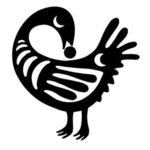Sankofa for Equitable Fisheries Livelihoods in Africa is the social interphase for the Creating Synergies between Indigenous Practices and Scientific Knowledge (ISIPSK) research project led by Dr Ifesinachi Okafor-Yarwood. The research is funded by The PEW Charitable Trusts under the 2023 Marine Fellows program in Marine Conservation. The research is supported by Josephine Laryea Asare, as part of her PhD studies at the University of St Andrews – School of Geography and Sustainable Development.
Our Research Objectives are threefold:
- To harmonise historical marine conservation practices that can be integrated with current scientific conservation practices.
- To advance knowledge on the gendered socio-economic impact of implementing a closed fishing season in Ghana as a case study country.
- To develop innovative ways of disseminating information to develop an effective sub-regional fisheries conservation and sustainable livelihood plan.
Why Sankofa?
The research project has adopted Sankofa for local communication with stakeholders in Ghana and its social interphase. Sankofa is an Adinkra symbol traditionally used by the Akan people of Ghana (who originated from the people of Gyaman i.e. present-day Côte D’Ivoire). The Adinkra symbols visually communicate wise sayings and proverbs.

Sankofa is symbolised by a bird with feet facing forwards but its head turned backwards and carrying an egg in its beak, and this egg signifies hope for new life. Sankofa in the Akan language can be translated as “return and fetch it”. In details, Sankofa can be broken into two words: san meaning ‘return’ and kofa meaning ‘to bring back or fetch something’.
The meaning of Sankofa resonates with the research aim of returning to indigenous (African) practices historically applied for marine conservation to create synergies between them and scientific knowledge for an equitable, sustainable and inclusive fisheries management. Consequently, the research project has adopted the Sankofa name and symbol for effective communication of the research objectives with local stakeholders in Ghana.